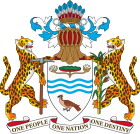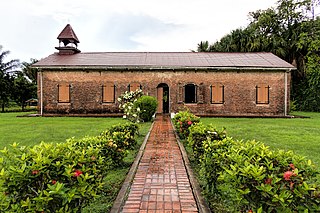 |
|---|
| Constitution |
The Popular Party was a political party in British Guiana.
 |
|---|
| Constitution |
The Popular Party was a political party in British Guiana.
The party was established in 1926 by a group of middle class liberals, and was led by Nelson Cannon and A. R. F. Webber. [1] The party's General Council was largely black middle class professionals, and attracted support from the trade unions led by Hubert Nathaniel Critchlow. [1] Running on a platform of economic development and campaigning against British colonial policies, [1] the party received most of the black vote in the general elections later that year, [2] winning twelve of the 14 elected seats. [1]
A a result of the party's success in the elections, the British authorities made constitutional changes in 1928, replacing the Combined Court with the Legislative Council. The new Council had a majority of appointed members, giving the conservative white population a majority over the Popular Party, who opposed the reforms. [1]
As a result of disquiet about the reforms, it was suggested that the Popular Party candidates should be unopposed at the 1930 elections. Ultimately eight of their candidates were returned unopposed, and despite a few serious challenges, only one seat changed hands. [1] The party also won seats in the 1935 elections. [3]
The history of Guyana begins about 35,000 years ago with the arrival of humans coming from Eurasia. These migrants became the Carib and Arawak tribes, who met Alonso de Ojeda's first expedition from Spain in 1499 at the Essequibo River. In the ensuing colonial era, Guyana's government was defined by the successive policies of Spanish, French, Dutch, and British settlers. During the colonial period, Guyana's economy was focused on plantation agriculture, which initially depended on slave labor. Guyana saw major slave rebellions in 1763 and 1823. Following the Slavery Abolition Act of 1833, 800,000 enslaved Africans in the Caribbean and South Africa were freed, resulting in plantations contracting indentured workers, mainly from India. Eventually, these Indians joined forces with Afro-Guyanese descendants of slaves to demand equal rights in government and society. After the Second World War, the British Empire pursued policy decolonization of its overseas territories, with independence granted to British Guiana on May 26, 1966. Following independence, Forbes Burnham rose to power, quickly becoming an authoritarian leader, pledging to bring socialism to Guyana. His power began to weaken following international attention brought to Guyana in wake of the Jonestown mass murder suicide in 1978.

British Guiana was a British colony, part of the mainland British West Indies, which resides on the northern coast of South America. Since 1966 it has been known as the independent nation of Guyana.

Cheddi Berret Jagan was a Guyanese politician and dentist who was first elected Chief Minister in 1953 and later Premier of British Guiana from 1961 to 1964. He later served as President of Guyana from 1992 to his death in 1997. In 1953, he became the first Hindu and person of Indian descent to be a head of government outside of the Indian subcontinent.

The 1874 United Kingdom general election saw the incumbent Liberals, led by William Gladstone, lose decisively, even though their party won a majority of the votes cast. Benjamin Disraeli's Conservatives won the majority of seats in the House of Commons, largely because they won a number of uncontested seats. It was the first Conservative victory in a general election since 1841. Gladstone's decision to call an election surprised his colleagues, for they were aware of large sectors of discontent in their coalition. For example, the nonconformists were upset with education policies; many working-class people disliked the new trade union laws and the restrictions on drinking. The Conservatives were making gains in the middle-class, Gladstone wanted to abolish the income tax, but failed to carry his own cabinet. The result was a disaster for the Liberals, who went from 387 MPs to only 242. Conservatives jumped from 271 to 350. Gladstone himself noted: "We have been swept away in a torrent of gin and beer".

Hugh Desmond Hoyte was a Guyanese politician who served as Prime Minister of Guyana from 1984 to 1985 and President of Guyana from 1985 until 1992.

Linden Forbes Sampson Burnham was a Guyanese politician and the leader of the Co-operative Republic of Guyana from 1964 until his death in 1985. He served as Premier of British Guiana from 1964 to 1966, Prime Minister of Guyana from 1964 to 1980 and then as the first Executive President of Guyana from 1980 to 1985. He is often regarded as a strongman who embraced his own version of socialism.

Elections in Guyana take place within the framework of a multi-party representative democracy and a presidential system. The National Assembly is directly elected, with the nominee of the party or alliance that receives the most votes becoming President.

Elections in Zambia take place within the framework of a multi-party democracy and a presidential system. The President and National Assembly are simultaneously elected for five-year terms.

General elections were held in the Gold Coast on 8 February 1951. Although elections had been held for the Legislative Council since 1925, the Council did not have complete control over the legislation, and the voting franchise was limited to residents of urban areas meeting property requirements and the councils of chiefs. The 1951 elections were the first in Africa to be held under universal suffrage.

The Constitution of Guyana is the highest governing document in the Republic of Guyana. It came into effect on October 6, 1980, replacing the constitution enacted in 1966 upon its independence from the United Kingdom. The current Constitution of Guyana contains 12 chapters that are further divided into 232 articles. It also contains a preamble and an oath. Since its 1980 enactment, it has gone through multiple amendments.

General elections were held in British Guiana on 27 April 1953. They were the first held under universal suffrage and resulted in a victory for the People's Progressive Party (PPP), which won 18 of the 24 seats in the new House of Assembly. Its leader, Cheddi Jagan, became Prime Minister.

General elections were held in British Guiana on 24 November 1947. The British Guiana Labour Party emerged as the largest party, winning five of the 14 seats. Voter turnout was 71%.

General elections were held in British Guiana in September 1930.

General elections were held in British Guiana on 15 October 1926.

General elections were held in British Guiana in 1916.

General elections were held in British Guiana in 1892.

The Combined Court was the legislature of British Guiana until 1928. In its final form, it consisted of a sitting of the Court of Policy together with the elected Financial Representatives.

The Court of Policy was a legislative body in Dutch and British Guiana until 1928. For most of its existence it formed the Combined Court together with the six Financial Representatives.

The House of Assembly was the legislature of British Guiana in the 1950s and 1960s.

The Manpower Citizens' Association was a trade union and political party in British Guiana.